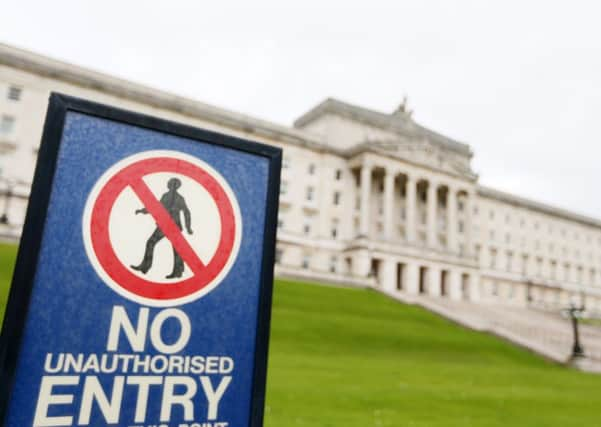New Stormont battle as DUP calls for imminent move to direct rule


As a new battleground over direct rule opens up between the parties – and potentially between London and Dublin – Nigel Dodds yesterday told Parliament that “we cannot allow the drift to continue”.
Sinn Fein has repeatedly warned of unspecified dire consequences with an “international” dimension if the government steps in to formally revoke devolution.
Advertisement
Hide AdAdvertisement
Hide AdReferring to the nine months since devolution collapsed in January, the DUP’s Westminster leader told MPs: “We cannot allow the drift to continue. At some point in the very near future, we will need to have ministers.
“If they are not Northern Ireland Executive ministers – we and other parties want them to be, but Sinn Fein is blocking that – they will have to be ministers from here.
“They will have to take decisions, because we cannot allow the economy or Northern Ireland to drift. We will work with them in this place to ensure that the good governance of Northern Ireland continues, alongside Northern Ireland politicians in a consultative role back home at Stormont.”
Mr Dodds re-emphasised, in Parliament and then in a later statement, that any such direct rule arrangement would involve Tory ministers acting “in consultation with our politicians back home”, a seemingly tacit acceptance that Sinn Fein will still have input into the process even though the party’s MPs refuse to take their seats in Westminster.
Advertisement
Hide AdAdvertisement
Hide AdYesterday Sinn Fein’s chief negotiator, Conor Murphy, sounded pessimistic about the prospects of any agreement with the DUP over the next 10 days before a direct rule budget is introduced at Westminster.
The Newry and Armagh MLA said: “Unless there’s a step change on the part of the DUP and both governments on the issues of rights, it is very unlikely we are going to see any agreement in the next period of time to see the institutions back in place.”
However, the government has been attempting to play down any suggestion that formal direct rule is even a possibility at this stage.
Yesterday the Irish government said that the taoiseach and the prime minister had spoken by phone and “agreed that the gap between the two parties is narrow”.
Advertisement
Hide AdAdvertisement
Hide AdHowever, significantly it went on to say: “The taoiseach made the point that there could be no return to direct rule as it existed prior to the Good Friday Agreement and that the various provisions of the agreement would have to be honoured.”
At first glance, that appeared to be a change of tone from what Irish Foreign Minister Simon Coveney said the previous day when he accepted that it was “the British government’s responsibility to ensure good governance in Northern Ireland”, something which appeared to be an acceptance that if devolution cannot be restored there would be some form of direct rule
However, on closer inspection, the taoiseach’s reference to direct rule as it existed prior to 1998 appeared to be a reference to a form of direct rule which would not be on the cards anyway, given that there had been several returns to direct rule since the agreement.
Mrs May’s official spokesman said of the call: “They talked about the responsibility on parties to overcome their differences and the need for them to compromise on the outstanding issues.” Mrs May believes it is “not in anybody’s interests” for there to be a return to direct rule, he added.
Advertisement
Hide AdAdvertisement
Hide AdBut the Tory chair of the Commons’ Northern Ireland Affairs Committee, Andrew Murrison, a former NIO minister, had a different analysis, tweeting that it “feels like we’re in the foothills of direct rule”.
Speaking in the Commons yesterday, James Brokenshire reiterated that he will use Westminster to pass a Stormont budget if the DUP and Sinn Fein cannot agree to get such a bill through the Assembly by the end of this month.
Although he retained a degree of optimism about the possibility for some breakthrough, Mr Brokenshire admitted that it was “now highly unlikely” that an Executive could be formed and pass a budget in the next 27 days.
Attempting to put political distance between himself and the figures within the budget which will be tabled in his name, Mr Brokenshire said that it would “incorporate figures provided by the Northern Ireland Civil Service, reflecting its assessment of the outgoing priorities of the previous Executive” and that it would “not set out any spending decisions by me or the government”.
Advertisement
Hide AdAdvertisement
Hide AdThe secretary of state also emphasised that he was “taking this step with the utmost reluctance and only in the absence of any other option” and insisted that “passing a budget in Westminster does not mark a move to direct rule any more than the passing of legislation by this House to set a regional rate did in April”.
Labour’s shadow secretary of state, Owen Smith, said that “direct rule will be a profoundly damaging, retrograde step in the peace process”. However, he then went on to suggest how a variant of direct rule could operate, saying: “A shadow Assembly of some sort, perhaps scrutinising or even advising direct rule ministers, would be a way to sustain vital north-south and east-west relations and institutions – things that are crucial to the Belfast/Good Friday Agreement. That might provide some mitigation.”
Meanwhile, back in Belfast SDLP MLA Daniel McCrossan told Sinn Fein to “come clean with the public and admit that the failed negotiation between Sinn Fein and the DUP is set to deliver British direct rule”.
He said: “A budget is a fundamental function of any government, it is therefore obvious that if this function is carried out in London instead of in Belfast that automatically means direct rule. It can’t be painted, polished or presented in any other way.”